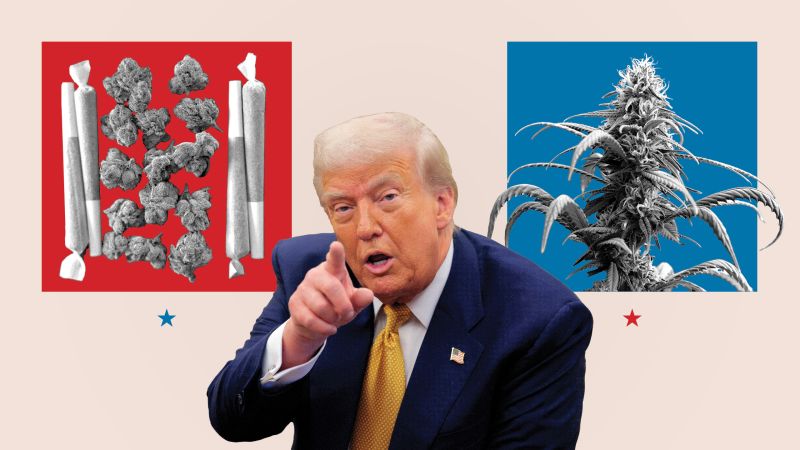In a recent gathering at his private estate in Bedminster, New Jersey, former President Donald Trump engaged in discussions that revealed his thoughts on a pressing political issue: the potential loosening of federal restrictions on marijuana. Attendees reported that Trump expressed his willingness to explore this matter, confirming, “We need to look at that,” highlighting a willingness to revisit a topic that has garnered increasing attention in the American political landscape.
This isn’t the first time Trump has indicated a desire for change regarding marijuana policies. Approximately a year prior, he suggested that his return to the presidency could signify a turning point for marijuana legislation, potentially allowing for easier access to safe products for adults and granting states more autonomy in deciding legalization issues. His inclination to remove marijuana from the same classification as hazardous drugs like heroin positioned him uniquely among his Republican contemporaries. This shift aimed to resonate with younger constituents, minority groups, and voters who lean libertarian.
However, despite these assertions, one can observe that Trump has yet to advance substantive action regarding marijuana policy since the initial promises made in his campaign. Seven months into his current term, the absence of decisive moves on this front is a striking inconsistency for a president otherwise keen on delivering on his campaign commitments. Internal discussions within Trump’s team portray a divide: while many of his political advisors push for progressive reform on marijuana to bolster GOP support ahead of upcoming midterm elections, other policy advisors express caution regarding the moral and legal implications associated with less restrictive policies.
White House spokesperson Abigail Jackson conveyed that the administration is considering all dimensions of potential marijuana policy changes, reiterating that the guiding principle behind any decision will prioritize what is best for the American populace. Meanwhile, mixed signals abound regarding the trajectory of any impending reforms. For instance, James Hagedorn, CEO of Scotts Miracle-Gro, mentioned that Trump had assured him privately that he intends to ease restrictions on marijuana, a move that aligns with the interests of his company, which has significantly invested in the cannabis sector.
Nevertheless, Trump’s newly appointed head of the Drug Enforcement Administration (DEA), Terrance Cole, has not explicitly included marijuana reform among his top priorities, much to the chagrin of industry advocates like Hagedorn. This omission is interpreted as indicative of a more traditional law enforcement approach, further complicating the discourse surrounding potential policy updates. Advocates for marijuana reform stress the need for Trump to reaffirm his commitments, especially considering the mixed political climate surrounding this issue.
The discourse surrounding marijuana classification is particularly poignant, given its current status as a Schedule 1 drug, categorized alongside substances like heroin, which carry heavy restrictions due to their perceived risks. Trump has previously indicated support for lowering marijuana to a Schedule 3 classification, which would considerably ease restrictions and enable further research opportunities on potential medical applications.
As the conversation progresses, various voices from within the industry, including influential figures like podcaster Joe Rogan, urge Trump to take action that aligns with public sentiment favoring legalization. Recent polling shows that approximately 60% of Americans support the legalization of recreational marijuana, indicating a significant shift in societal attitudes towards its use. This data point places additional pressure on Trump to act, particularly as he risks losing favor with younger demographics who prioritize such reforms.
The political landscape surrounding marijuana reform is far from settled, particularly as Trump navigates competing pressures from different factions within his base. While some advisors champion the need for change to attract a broader voter base, others caution against potential backlash that could arise from altering a long-anchored tough-on-crime stance.
In summary, Trump’s current deliberations on marijuana policy reflect not just an evolving political strategy but also a microcosm of the broader societal shifts regarding cannabis use and regulation. As the 2024 presidential election approaches, these discussions will likely continue, with the potential to significantly influence Trump’s standing among young voters and contract the GOP’s traditional demographic lines. The juxtaposition of public interest, economic implications, and law enforcement perspectives will shape the final outcome of any policy initiatives surrounding marijuana in the near future, underscoring the complexity of modern governance.











